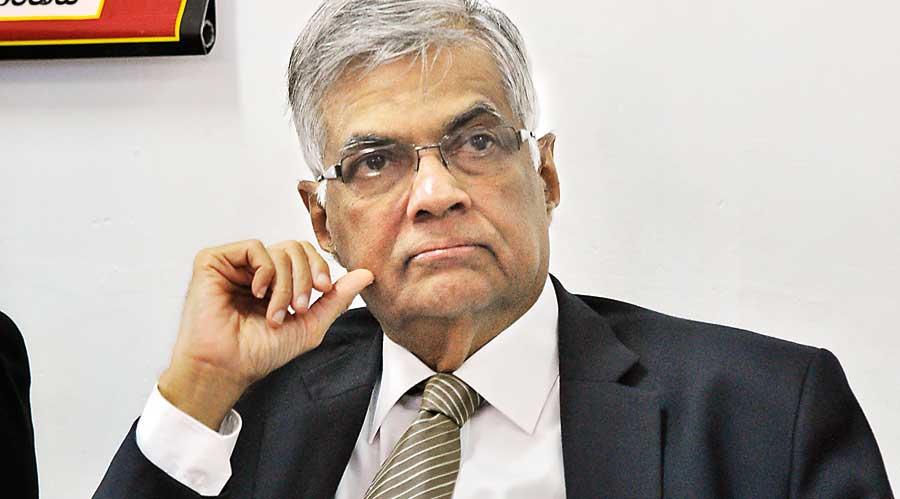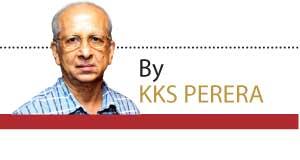Reply To:
Name - Reply Comment
Put him on a Pedestal; He has a Role!

Though he makes a crafty backdoor entry to Parliament, Ranil Wickremesinghe has an assigned job, not to lead a political party, but give utmost of specific expertise, knowledge, talent or genius in politics to rulers, as someone skilled, experienced, and respected in political circles both locally and internationally. His decision has sent shockwaves among some SJBs; others already had prior powwows. Whatever the criticisms levelled against him, Ranil had confirmed his reputation as elder statesman who could guide young politicians using his wealth of experience in shaping their future.
to lead a political party, but give utmost of specific expertise, knowledge, talent or genius in politics to rulers, as someone skilled, experienced, and respected in political circles both locally and internationally. His decision has sent shockwaves among some SJBs; others already had prior powwows. Whatever the criticisms levelled against him, Ranil had confirmed his reputation as elder statesman who could guide young politicians using his wealth of experience in shaping their future.
As a wise visionary in managing public affairs, economic function and foreign relations his services to the nation is imperative at this crucial moment. Wickremesinghe 72, the longest surviving parliamentarian, [first entered the legislature in 1977] is to be sworn in on June 23, 2021. After 44 years in politics Wickremesinghe has been discarded to a man of absolute failure. He is a political strategist, an incredibly clever man, one of the sharpest minds, who takes courageous decisions in circumstances. True, there are negatives; we have seen his childish behaviour in the August assembly. He in fact appointed his chum, a dubious character, as the governor; a huge blunder which resulted in a 70 billion fraud at Central Bank under his administration.
"The present government discarded the price formula set up by the UNP in 2018. The savings from the drastic drop in global prices should not be passed on to people. Ranil’s stringent tax policy yielded a healthy 13% of the GDP, which has now dropped below 8.5%."
Ranil who initially declined a request from the UNP’s WC after it suffered the history’s worst defeat at the 2020 parliamentary elections, failing to secure even a single seat except for the one national list seat to accept it, saying that a younger member should take it up. An ‘ace trickster’ in politics, Ranil, nephew of ‘Old Fox’ Junius Richard Jayewardene was eventually destined to accept the seat. The decision has delayed the end of old era of the political history of Sri Lanka, as well as the symbolical end of the Grand-Old-Party.
JR, who “hated” family bandyism, openly declared that he had no prince to crown. However, he secretly groomed the cousin’s son, young Ranil Wickremesinghe for future leadership; but realizing he was slow in gearing-up or displaying maturity, in 1980s JR sought a dynamic alternative in Cousin Upali Wijewardene. Sri Lanka hasn’t produced mature political leaders, who could become statesmen. For Ranil, the most knowledgeable and experienced leader among the contemporary, is not too late for him to give up playing politics further.
The dissidents who formed SJB suggest a Sinhala-Buddhist racist approach; they think UNP lost the Sinhala Buddhist vote bank and that they need to win it back—which is against UNPs history and thinking of its leaders’ like D. S. Senanayake. Ranil did not want to mix politics with religion. His success in areas such as the economic policy, media freedom and reforms, have laid part of the basics for a stable recovery during UNP rule 2001-2004. Taking over from Premadasa, Wijethunga; Ranil had to be reminded on observance of ‘Pansil’ at the commencement of meetings at Sirikotha, only to be told, “Do it at home and come.”
"After 44 years in politics Wickremesinghe has been discarded to a man of absolute failure. He is a political strategist, an incredibly clever man, one of the sharpest minds, who takes courageous decisions in circumstances."
Contentious news coincided with Ranil’s entry that of removal of young dynamic choice by the Weligama urbanized electors as their Chairman. News item says, the gazette was the result of a determination by the Supreme Court. It further said, the UNP decision was based on Election Commission’s recommendation to remove Rehaan Jayawickreme, a third generation descendent of powerful Southern UNPer, the late Montague Jayawickrema, as Weligama UC Chairman. Rehaan, was one of the few dynamic well-mannered politicians in the country, who possessed an upbringing inherited from his distinguished background. However, acts of disobeying the rules, and discipline cause obstacles to the democratic process. Only Discipline makes a person important in society. If a Party lacks discipline, disorder occurs in it: best example is “Pohottuwa’s”, ongoing calamity. Strict discipline must be imposed especially on young members, they should not be allowed to win from ‘A’ and cross over to ‘B’. In short, UNP lost a good future prospect, but an undisciplined defiant in Rehaan, to Sajith’s SJB - did they gain? Discipline and Democracy are interdependent— unless politicians are well-disciplined, law and order will not prevail. Young politicians need to abide by the norms. The courts consequently ruled not in favor of these members and had instructed the Election Commission to remove them from their positions.
Born in 1949, Ranil Wickremesinghe was the second son of Esmond Wickremesinghe, [a former LSSPer, who became a press baron managing the Lake House Group] and Nalini Wickremesinghe née Wijewardena. He is the grandson of Cyril Wickremesinghe CCS and Chairman of Associated Newspapers Ltd., D. R. Wijewardena. He took oaths as an advocate in 1972 after completing an apprenticeship under H. W. Jayewardene QC. For his significant contributions in restructuring in education, economy, and human rights, Wickremesinghe was awarded an honorary doctorate by Deakin University in Australia. He has written widely on history, Buddhism and international politics contemporary developments in all fields of knowledge like public policy, political economy and government.
"Ranil served as an MP from 1977 to 2020, and as Prime Minister from 1993 to 1994, 2001 to 2004, 2015 to 2018 and 2018 to 2019 and as Leader of the Opposition from 1994 to 2001 and from 2004 to 2015."
Ranil served as an MP from 1977 to 2020, and as Prime Minister from 1993 to 1994, 2001 to 2004, 2015 to 2018 and 2018 to 2019 and as Leader of the Opposition from 1994 to 2001 and from 2004 to 2015.
The nationalistic movements strongly opposed his Cease Fire Agreement with LTTE, continuously protesting against it as a threat to the sovereignty which could lead to a separate state called Ealam: especially the offer of LTTE a self government with all the pre-requirements for a separate state, when Prabhakaran dragged the peace talks to accumulate arms and ammunition; he failed. His foreign policy was seen as moving away from the isolationist policies, which detached Sri Lanka from the west. His policies were based on attraction of investment and financial aid.
Stick to long-overdue Fuel Increase: Further Diesel Hike Imperative
Ranil always advocated on stabilizing fuel prices; he never played politics with economic issues. Refined petroleum are closing in on US$ 80/- a barrel with the crude oil also increasing expecting a global recovery. Analysts project a US$ 100/- a barrel within the next six to eight months based on the expected recovery of major economies and air travel. Crude oil at the Brent was trading above US$ 73 a barrel while refined petrol was US$ 79 a barrel. Sri Lanka which announced important hikes in prices last week has spent US$ 347.2 million on oil imports in March 2021. We make a profit of about 4/- on petrol; consumption of diesel is 2.5 Lit and 2.8 million of petrol. Government still loses 12/- per litre on diesel after a tax of 12/-. Net cost of fuel is about US$ 3.5 billion annually. Kerosene is consumed heavily in factories for furnaces and boilers: upper echelons of society enjoy the benefit. It is irrational, absolutely no sense in proposing price reductions in fuel. They should re-introduce Ranil’s [Mangala] formula and make small monthly increases. As Wickremasinghe recently proposed, a voucher system to offer fuel to over 18s; is a wise move; a type of ‘cash transfer’ to compensate the deserving categories, say, Samurdhi beneficiaries.
In many countries, diesel is priced somewhat higher than petrol due to its advanced calorific content. The present government discarded the price formula set up by the UNP in 2018. The savings from the drastic drop in global prices should not be passed on to people. Ranil’s stringent tax policy yielded a healthy 13% of the GDP, which has now dropped below 8.5%.
We are now in a state of a deep crisis; not only the Rajapaksa brothers, but all the previous rulers including failed ‘Yahapalanists’, who are evenly answerable for the catastrophe that the nation is undergoing. When others only blame the government, Ranil gave a plan, explaining what needs to be done and pointed out the mistakes, especially the risks involved with losing GSP+. If we are to meet the 21st century sustainability challenges, and salvage the country, we need a guru who had displayed profundity and acumen in politics, foreign policy trade and commerce and governance.
Will he continue his rather pathetic political agenda or make an overall change in his approach?